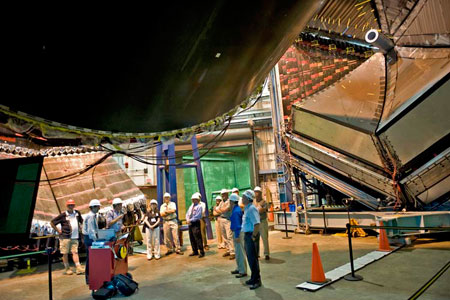
Independent Project Review committee members, visiting JLab to evaluate the readiness of the 12 GeV Upgrade project, tour Hall B during their site visit. Here they view the CEBAF Large Acceptance Spectrometer as Hall B Leader Volker Burkert and Lead Engineer Dave Kashy explain the system.
NEWPORT NEWS, VA - The U.S. Department of Energy's Thomas Jefferson National Accelerator Facility successfully completed a major review on July 24 as it seeks approval to start construction on a planned $310 million project that will double the energy of the electron beam used in nuclear physics experiments.
An Independent Project Review panel from the DOE Office of Science's Office of Project Assessment concluded that designs for the so-called 12 GeV Upgrade are impressive and the project is ready for the start of construction. The 25-member team headed by Daniel R. Lehman, director of the Office of Project Assessment, examined all aspects of the project, including technical, cost, schedule, management, and safety during a three-day session held at Jefferson Lab.
The review was required before the lab can request DOE approval to start construction, or what is known as Critical Decision-3 or CD-3. Construction is expected to begin in the 2009 Fiscal Year.
JLab Director Christoph Leemann thanked the review team, the DOE, the scientific user community; the laboratory and "above all, members of the project team, all of whom contributed to the success of the review and the success of the project."
"It is gratifying and rewarding," Leemann said, "to see years of tenacity and perseverance come to fruition, to have established a solid place in the scientific landscape, to have an outstanding team and excellent systems in place and integrated into the laboratory, and to look forward to start the great enterprise of actually building the upgrade. I remain convinced that advancing this project with all the vigor we are capable of is the best we can do for the future of the laboratory."
In addition to doubling the energy of Jefferson Lab's electron beam from 6 billion electron volts (GeV) to 12 billion electron volts, plans call for the construction of a fourth experimental hall and upgraded experimental equipment in the existing halls. Once completed, the 12 GeV facility will provide scientists with a one-of-a-kind tool to study the behavior of quarks in protons and neutrons, and the mechanism that eternally locks quarks and gluons inside them.
Jehanne Simon-Gillo, acting associate director of the Office of Science for Nuclear Physics, praised the work done by the review committee and thanked its members for a well-managed and outstanding job. She also had complimentary words for the 12 GeV Project team and Leemann, who will retire at the end of August, for bringing the project to an important milestone.
"The laboratory and 12 GeV Project team, under Christoph Leemann's leadership, have done an excellent job in keeping this project on track, and the outcome of the review clearly shows that they are ready for the initiation of construction," says Simon-Gillo. "The laboratory has made the 12 GeV Project its highest priority during times of constrained budgets, and this has not been without consequence to its current program. The efforts and sacrifices on behalf of the laboratory, as a whole, in bringing the 12 GeV project to this stage are recognized and appreciated."
To explore protons and neutrons, Jefferson Lab's accelerator propels a beam of electrons at nearly the speed of light around a massive underground "racetrack" that is 7/8 mile around. The speeding electrons strike the protons and neutrons within the atom's nucleus. Huge detectors then measure the speed, direction, and energy of the scattered particles, so scientists can study the most fundamental constituents of matter.
The facility, which operates on a 206-acre campus, employs more than 650 people and is a center for nuclear physics research and education. It is one of 17 national laboratories and facilities overseen by DOE and is managed and operated by Jefferson Science Associates, LLC, a company formed by the Southeastern Universities Research Association and Computer Sciences Corp.

